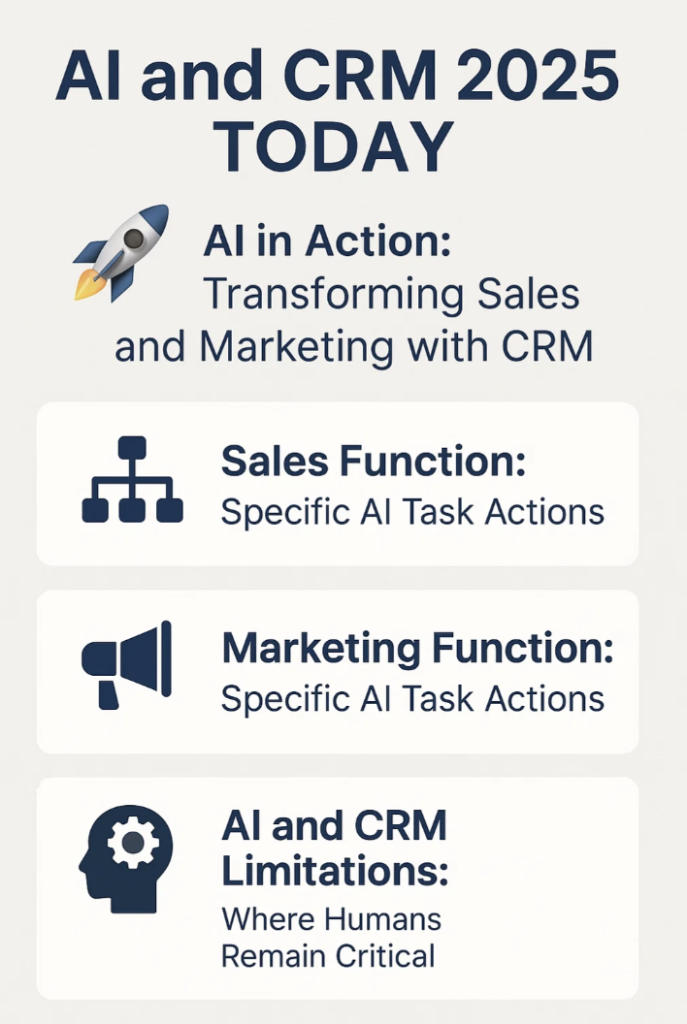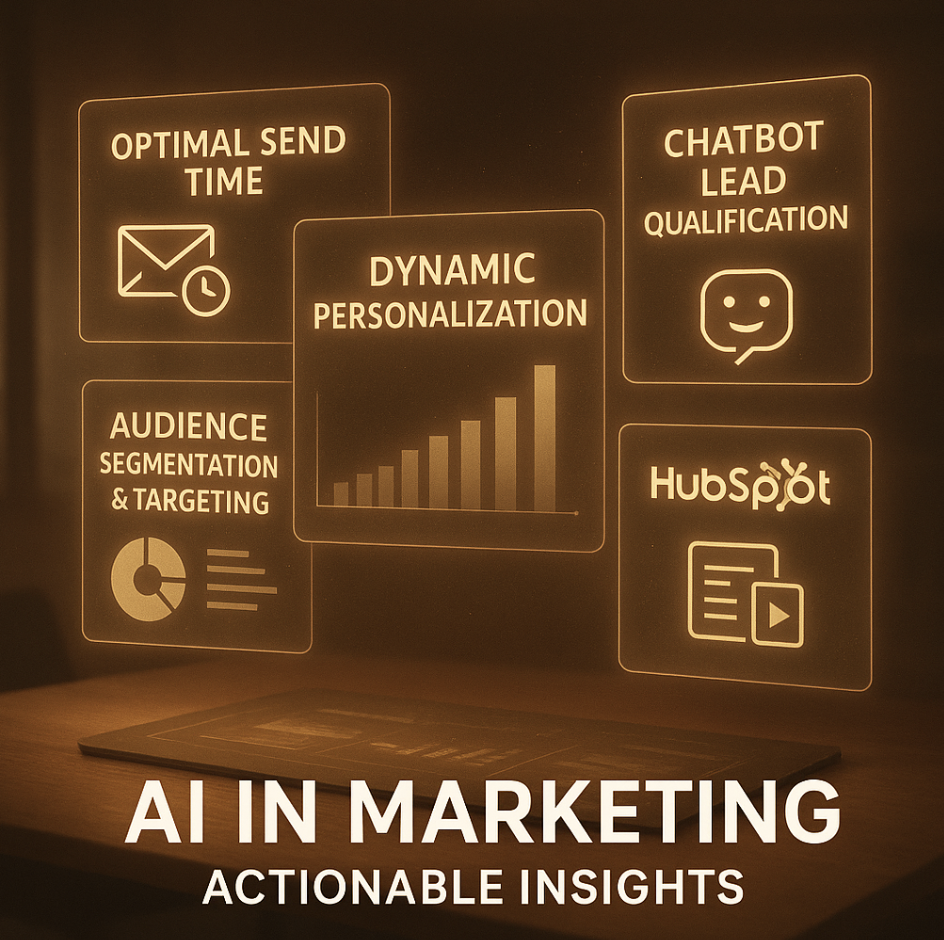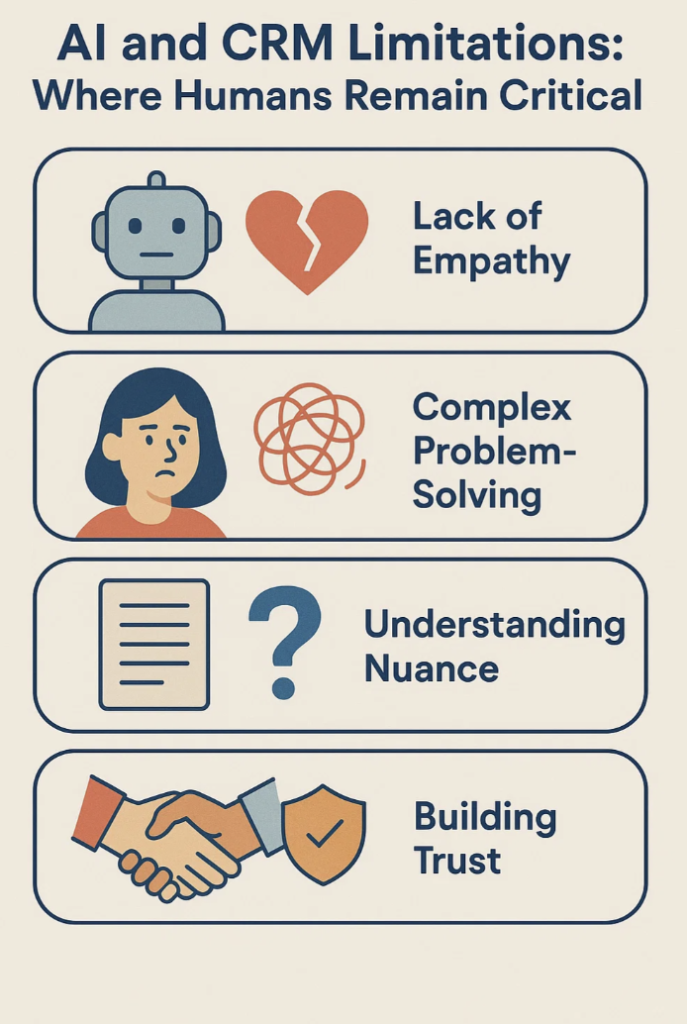AI in Action: Transforming Sales and Marketing with CRM
This special edition newsletter focuses on the specific, actionable ways that Artificial Intelligence is revolutionizing the Sales and Marketing functions within global Customer Relationship Management (CRM) platforms. We’re moving beyond the basics to detail the “how” and “what” with comprehensive, platform-specific examples.
Sales Function: Specific AI Task Actions

AI-powered CRM is turning sales teams into hyper-efficient, highly targeted revenue engines by automating critical thinking and manual labor.

| Specific Task Action | How AI Helps | Global CRM Example |
| Predictive Lead & Opportunity Scoring | AI models analyze historical conversion data, customer firmographics, and digital engagement signals to assign a predictive score to each lead, telling sales reps exactly who to call next. | Salesforce Einstein: Automatically discovers and scores leads based on a company’s past successful conversions. Microsoft Dynamics 365 Sales: Uses AI/ML models for scoring leads and opportunities. HubSpot: Provides predictive lead scoring integrated with its sales hub. Odoo: Offers AI Lead Scoring : automatically prioritises leads based on conversion probability. |
| Next Best Action/Offer Recommendation | Based on real-time customer data (web browsing, recent purchases, service history), AI suggests the optimal action a sales rep should take or the specific product/service to offer during a live interaction. | Salesforce Einstein Sales Cloud: Provides “Next Best Action” recommendations. Microsoft Dynamics 365 Copilot: Gives context-sensitive guidance and next-best-step suggestions. HubSpot: Uses workflows and AI data to suggest the next task (e.g., call, email) for specific deal stages. Odoo: AI-driven automation rules can trigger customized follow-up activities or actions based on lead criteria or deal progression. |
| Automatic Call & Email Analysis (Conversation Intelligence) | Natural Language Processing (NLP) transcribes and analyzes call and email content for customer sentiment, keyword mentions, and competitor names, summarizing key takeaways and next steps. | Microsoft Dynamics 365 Sales (Conversation Intelligence): Analyzes call recordings to determine sentiment and track keywords. Salesforce Einstein Conversation Insights: Automatically analyzes conversations and updates records. HubSpot: Offers conversation intelligence tools to identify deal risks. Odoo: AI-based sentiment analysis: Helps understand customer emotions in emails or interactions. |
| Generative AI for Follow-Up & Preparation | Generative AI drafts personalized emails, follow-up messages, or meeting summaries using the customer’s history and the context of the deal, significantly reducing a sales rep’s administrative workload. | Microsoft Dynamics 365 Copilot: Generates personalized email drafts and summarizes complex opportunity records. HubSpot AI Content Assistant: Helps sales teams draft high-performing email copy and meeting summaries. Salesforce Einstein GPT: Generates content and summarizes meeting notes directly in the flow of work. Odoo: Uses AI-powered drafting to compose lead replies and follow-up emails based on conversation context. |
Marketing Function: Specific AI Task Actions
AI allows marketing teams to hyper-personalize campaigns, optimize content delivery, and engage customers before they even speak to a sales rep.

| Specific Task Action | How AI Helps | Global CRM Example |
| Optimal Send Time & Dynamic Personalization | AI analyzes individual customer email open and engagement patterns to determine the precise hour to send a message, and dynamically changes content based on the recipient’s profile. | Salesforce Marketing Cloud (Einstein): Predicts the optimal send time for each individual subscriber. HubSpot: Offers predictive send time and dynamic content personalization. Microsoft Dynamics 365 Marketing: Optimizes journey delivery with AI to maximize engagement. Odoo: Marketing Automation features can use AI-driven triggers and lead data to schedule emails for optimal individual timing. |
| Audience Segmentation & Targeting | AI identifies highly specific, high-intent audience segments based on complex, non-obvious patterns in customer behavior and preferences (e.g., predicted churn risk, intent data). | Salesforce Marketing Cloud: Uses Einstein Segmentation to predict and group high-value audiences. Microsoft Dynamics 365 Customer Insights: Unifies data with AI to create 360-degree profiles for hyper-segmentation. HubSpot: AI features help analyze customer data and recommend high-intent audiences from the CRM and web visitors. Odoo: While primarily rule-based, Odoo’s CRM can leverage AI Fields to auto-complete and enrich data (e.g., identify client industries), enabling more intelligent segmentation. |
| Chatbot Lead Qualification & Routing | AI-powered chatbots engage website visitors 24/7, ask qualifying questions using Natural Language Processing (NLP), and automatically create or update a lead record with gathered information. | HubSpot Chatbots: Automate initial service and sales queries, pre-qualifying leads. Salesforce Service Cloud (Einstein Bots): Handles routine inquiries and automatically routes complex cases. Microsoft Dynamics 365: Uses Copilot-powered virtual agents for customer service and qualification. Odoo: Provides integrated AI Chatbot functionality (often powered by ChatGPT/GenAI ) for website content and basic conversational lead qualification. |
| Automated Content Generation (Marketing Copy) | Generative AI is used to produce, test, and optimize marketing copy, such as email subject lines, social media posts, and short ad copy, tailored to specific audience segments. | HubSpot AI Content Assistant: Helps marketers generate blog ideas and initial drafts for emails/social media. Salesforce Einstein GPT: Creates tailored content based on customer data. Microsoft Dynamics 365 Marketing (Copilot): Generates draft campaigns and copy tailored to audience segments. Odoo: Integrates AI Text Generation across modules (e.g., Website, Marketing) to draft, refine, or rewrite text, such as campaign copy or social captions. |
AI and CRM Limitations: Where Humans Remain Critical
Despite the rapid advancements, AI is not a complete replacement for human judgment and interaction. The following limitations are difficult to overcome at the current pace of development:
Complex Relationship Building & Emotional Intelligence:
- AI excels at transactional and routine interactions, but it lacks the empathy, creativity, and nuanced judgment required to navigate complex, high-stakes negotiations or mend a severely damaged client relationship. Humans are still essential for building long-term trust with high-value clients.
Addressing Data Quality and Integrity:
- AI models are only as good as the data they are trained on (“Garbage In, Garbage Out”). Human oversight is required to cleanse, organize, and strategically tag the data feeding the AI. If data is biased or incomplete, the AI’s recommendations (e.g., lead scores, forecasts) will be flawed, leading to poor business decisions.
Strategic Vision and Contextual Adaptation:
- While AI can optimize within a defined strategy, it cannot independently formulate a new business strategy, pivot during a market disruption, or understand unique geopolitical or cultural contexts. Human strategists are needed to interpret AI insights and translate them into a coherent, forward-looking plan that aligns with broader company goals.






